Diamond Baron’s Ethics Key to Glittering Life
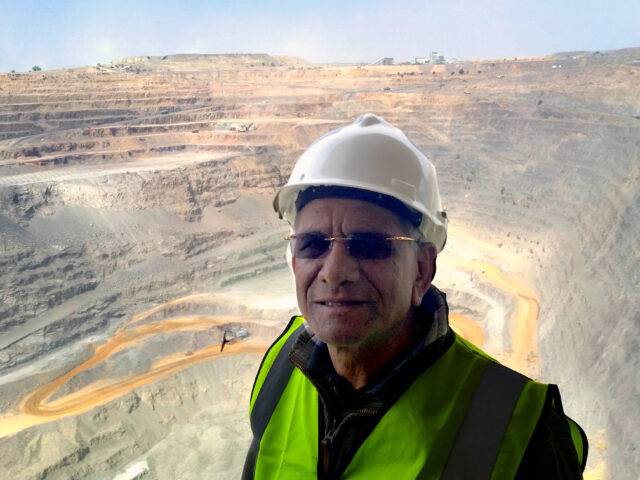
SB Veda
December 15th, 2022
Complete with a Hollywood-style pauper to prince narrative, transformative entrepreneur, Govind Dholakia, has revealed his compelling life story after working over a half century in India’s diamond industry. Narrated to Arun Tiwari who co-authored APJ Kalam’s acclaimed biography, Wings of Fire and Kamlesh Yagnik, president of Sarvajanik University and head of SRK Knowledge Foundation – both of whom are co-authors – Mr. Dholakia’s colourful memoir called Diamonds are Forever, So Are Morals, is an informative amalgam of business anecdotes and ethical instruction recounted in a charming conversational style.
Known as Govind Kaka (Govind Uncle) to his employees, from building a billion-dollar export business to running a subsidized domestic airline, to establishing a free English medium school, near-free medical clinic, and co-founding an 800-bed super specialty hospital, diamond baron, Mr. Dholakia’s many accomplishments bely his humble origins
Unlike others on India’s burgeoning list of tycoons such as the Ambani family, the Tatas, and the Birlas, Mr. Dholakia’s considerable fortune did not come from inherited wealth,. Neither could he avail of any societal advantages like graduation from prestigious institutions such as outsourcing entrepreneur, N.R. Narayan Murthy or tech mogul, Arjun Malhotra, both of whom are IITans. Indeed, Ratan Tata admitted as much when they met at Mr. Dholakia’s home in 2018. “I am where I am because of the circumstances into which I was born. You built your fortune from nothing,” he said.
Hailing from the impoverished farm belt in Western Gujarat, where he toiled in the wheat fields after school, he ultimately dropped out at age fourteen to hop a train to Surat with aspirations of seeking opportunities at the city’s factories.
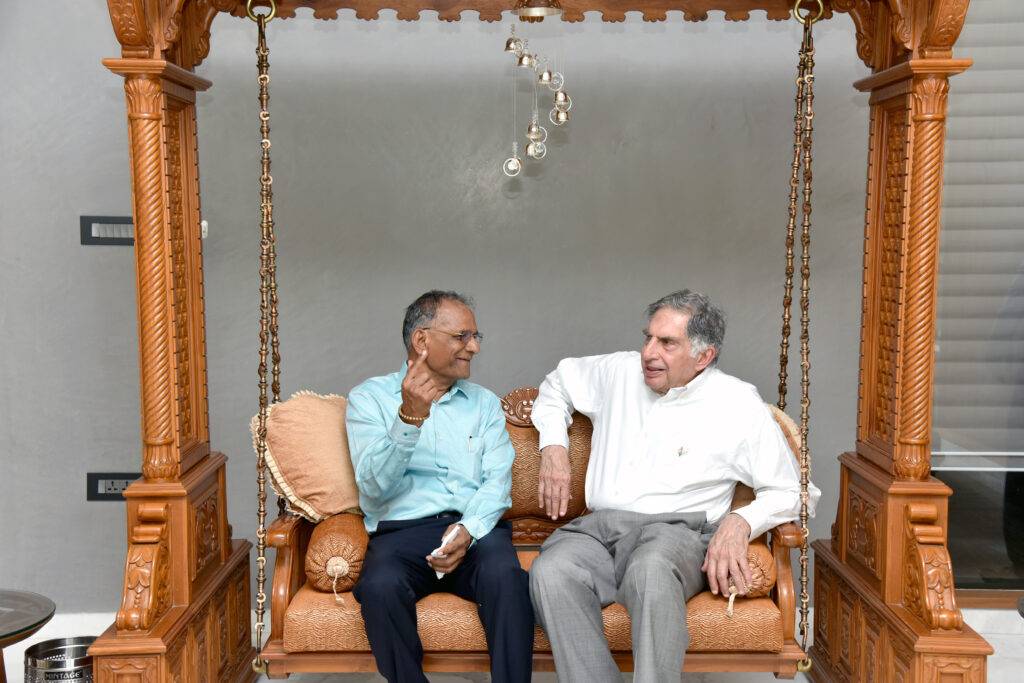
Govind Dholakia with Ratan Tata in Surat at Mr. Dholakia’s home. Mr. Tata mentioned that he was fortunate to be born into the wealthy Tata family and that he advantaged by his birth, whereas Mr. Dholakia, is an entirely self-made success.(Source: SRK Knowledge Foundation)
It was 1964 and Surat, which Mr. Dholakia has helped successfully metamorphize into a modern industrial hub, was then a cesspool of child labour, rampant petulance, ubiquitous pollution, and dangerous working conditions. Drawn to Surat’s already well-established diamond industry, he apprenticed as a polisher for six months during which time he was totally unpaid. Thereafter, he earned the paltry sum of Rs. 103 per month working in the factory.
Still, he was able to find solace in the work. “When I worked on the farm, the summers were so hot, it felt like my skin was ablaze. At least in the factory, I had some shade. Of course, there were no A/Cs or fans such as there are now – but when one experiences the burn of the Gujarat sun in the summer, shade offers tremendous relief.”
A far cry from the computer imaging and diamond cutting / polishing machines utilized at SRK’s modern, Empire building or even newer SRK House, then diamonds were cut and polished by hand. It was painstaking and arduous work. Still, the teenaged Dholakia found it gratifying. “It was very satisfying to see the lower-quality diamond scratching the gem diamond, stroke-by-stroke to remove diamond dust and small fragments until the crude scrape was accomplished.”
He wasn’t satisfied for long. “I was yearning to start my own little business…I wanted to be a leader and not a follower.” Indeed, when he brought up the idea, most thought he was delusional. Still, he remained undeterred in his conviction that he could make a success of himself.
He saved as much as he could – Rs. 500 – ultimately risking it all. He still needed his friend, Virjibhai to make up the Rs. 410 difference, generously offering up the household expenses budget, he bought his first set of ten rough diamonds for upfront cash. Earning a ten percent profit – near about a month’s wages – it became an addiction, and he was soon being offered many roughs to polish. It wasn’t long before his company named for his two favourite Gods, Rama and Krishna was born. So was Govind Dholakia, the Leader.
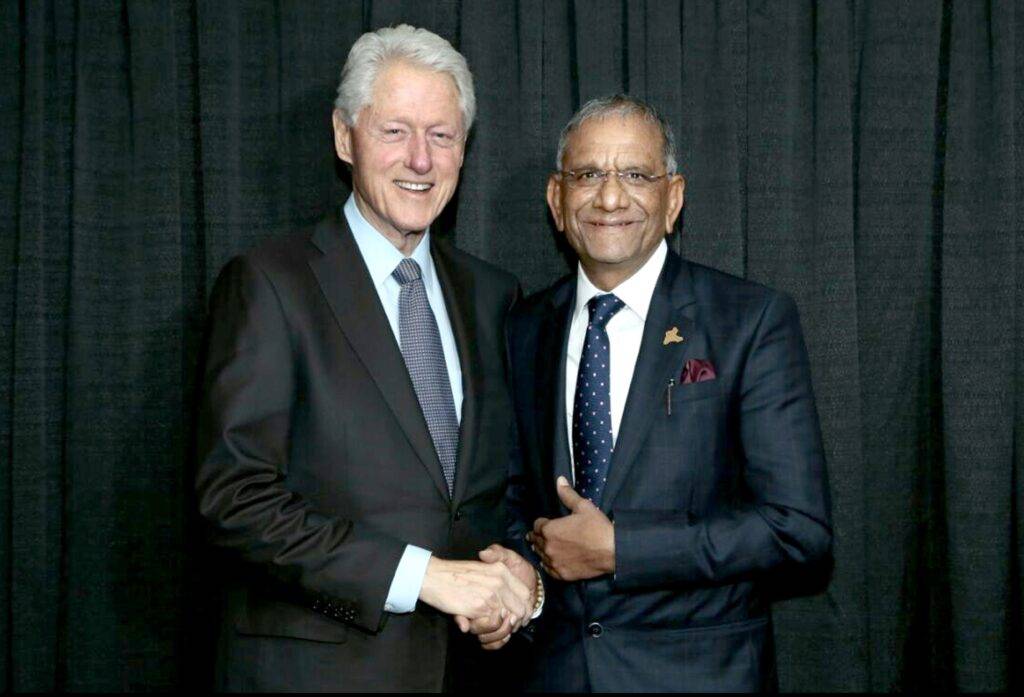
With the polishing business flourishing, he soon realised that the real money lay in exporting. Then, Antwerp, Belgium, was the World’s diamond premier trading hub. Dholakia and his closely knit band of cohorts took on a local Indian partner located in Antwerp to make the deals. The partner could speak good English, and he proved trustworthy, so many deals were brokered. .
While Mr. Dholakia’s first foray into polishing and big diamonds fell short of success, he remained undeterred, persevering, and becoming the leading polisher and exporter of large diamonds in Surat.
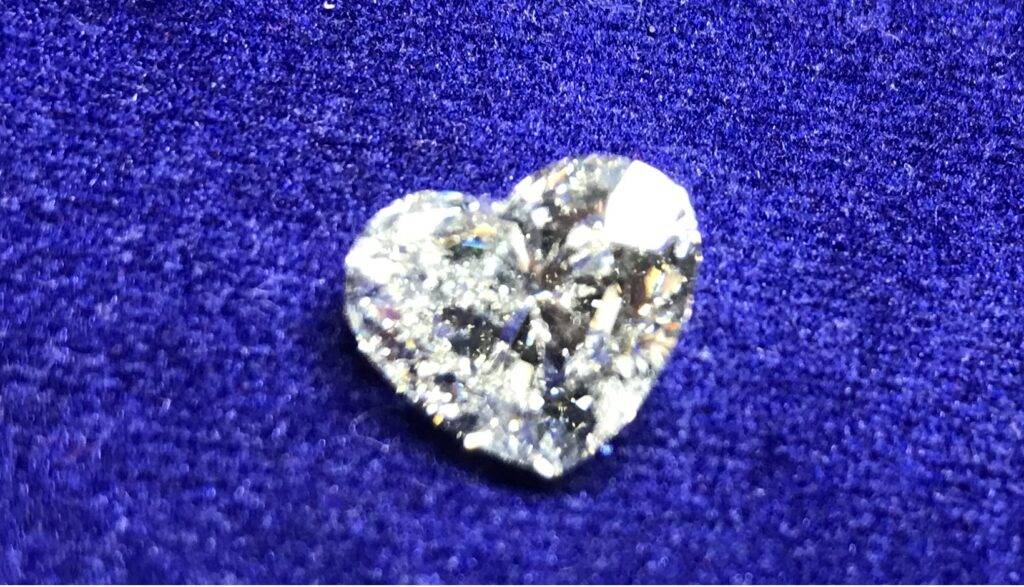
Ninety percent of the world’s diamonds are polished in India – and ninety percent of those diamonds are polished in Surat. As one might imagine, the volume of diamonds that Mr. Dholakia came to polish and export became significant. Ultimately shortly after the turn of the century, he became what’s called a ‘sight-holder’ for the global diamond mining giant, De Beers. This enabled him the privilege of buying rough diamonds directly from world’a largest diamond sourcing company, initially, in London and later in Africa when they moved their sight facility to Botswana.
Becoming a sight-holder was a rigorous process and Mr. Dholakia’s company, Sri Rama Krishna Exports (SRK) is one of a scant number of Asian companies, which hold this privilege.
GIVING BACK TO THE COMMUNITY
The general model of people who become wealthy in India is to seek respectability after gaining wealth and become superficially involved in works considered to be of social value. I, personally, know of such people in Kolkata – one crooked businessman who lectures about Sri Ramakrishna Paramhamsa at Bengali conferences – another is a Punjabi real estate mogul who opened up a private college similar to that of Donald Trump’s ‘university’.
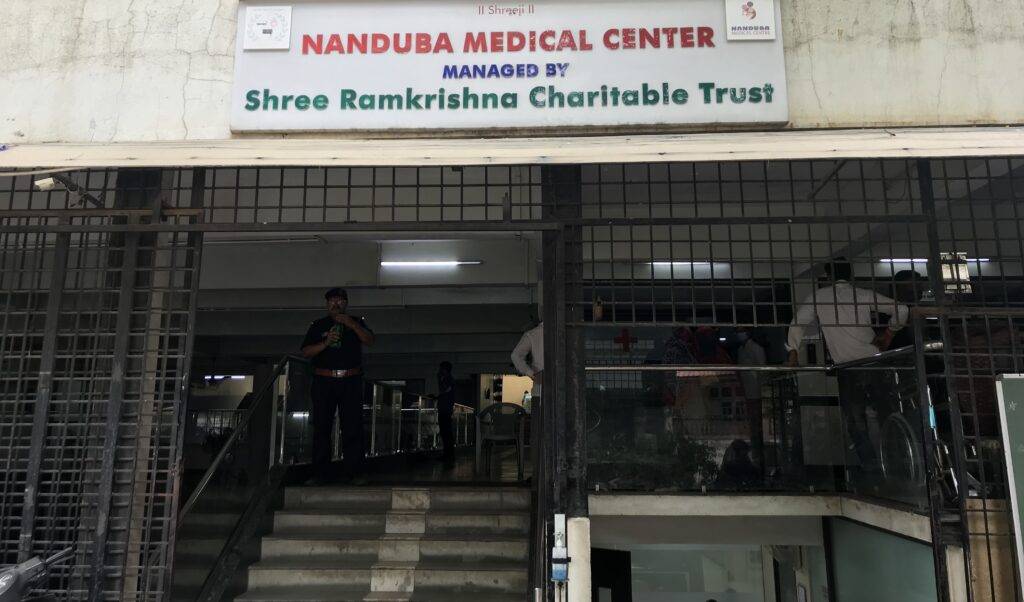
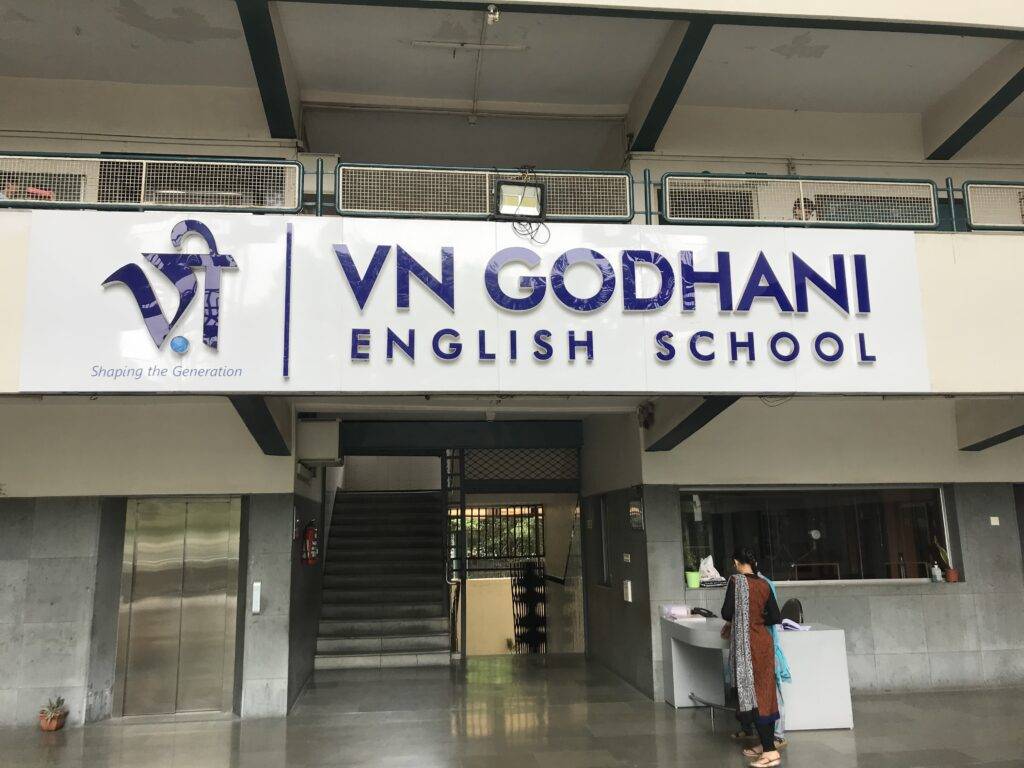
Unlike these frauds, Dholakia has given back to his community in a very real and meaningful manner. When I went to see Mr. Dholakia in Surat, I was shown the school that he founded, and the subsidized clinic that he established. In addition, he has set up a free clinic in his village where doctors go every day to treat a long line of patients.
Moreover, during my visit to Surat, I was taken to the 800-bed hospital, which Mr. Dholakia played an integral role in co-founding and for which he helped raise funds. Narendra Modi inaugurated the ground-breaking as Chief Minister, and went on to open the doors of the hospital as Prime Minister. Mr. Dholakia mentioned quite candidly how Mr. Modi helped shape the vision of the co-founders around the scale of facility and extent of development.
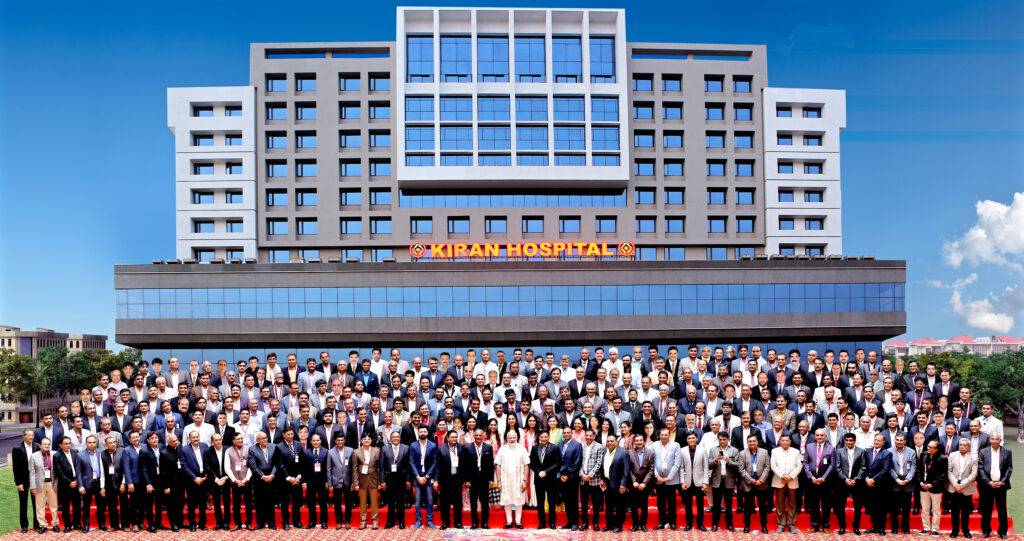
His foray into the airline business was to provide a low-cost domestic airline within Gujarat. It is a money-losing venture but one designed more as a public service to keep the airport running and active rather than a profit-making enterprise. Now, with the airport revitalised and some thirty flights taking off and landing in Surat, the airline serves his business and family needs.
By adhering to prerequisites and credits that address carbon, energy, water, waste, transportation, materials, health and indoor environmental quality, Dholakia’s ultra-modern offices have earned the US Building Council’s highest LEED Platinum certification, which is the highest rating that can be obtained. This is no small feat. The governments of certain Western nations have struggled to obtain LEED Green status – a full two rungs down the ladder!
One example of this innovation is the central air conditioning in his newest building, SRK House, completed in 2020: it uses no chemical coolant, running completely on water. Hence, it has zero greenhouse gas emissions. Indeed, the only effluent it produces is steam. This kind of modernization is truly revolutionary in a country like India in which the environment is literally the last priority (read that to mean no priority) for most businesses.
“Having been a child labourer, myself, I know what it’s like to have one’s childhood taken away. So, the issue is very close to my heart.”
– Govind Dholakia
Mr. Dholakia has helped clean up the once exploitative diamond polishing industry, leading by example to ensure that no children are working at his and affiliated factories. Indeed, his diamond cutters and polishers – all of whom are adults- are eligible to avail of an incentive program in which high performers share profits. SRK’s top diamond polishers can make, with profit sharing, upwards of several lakhs of rupees per month, the kind of salaries that top professionals such as doctors and finance professionals earn.
The facilities in his SRK House building contain resting rooms for those who wish to nap during the day. And, the canteen offers food and beverages throughout the day at no cost to the employee.
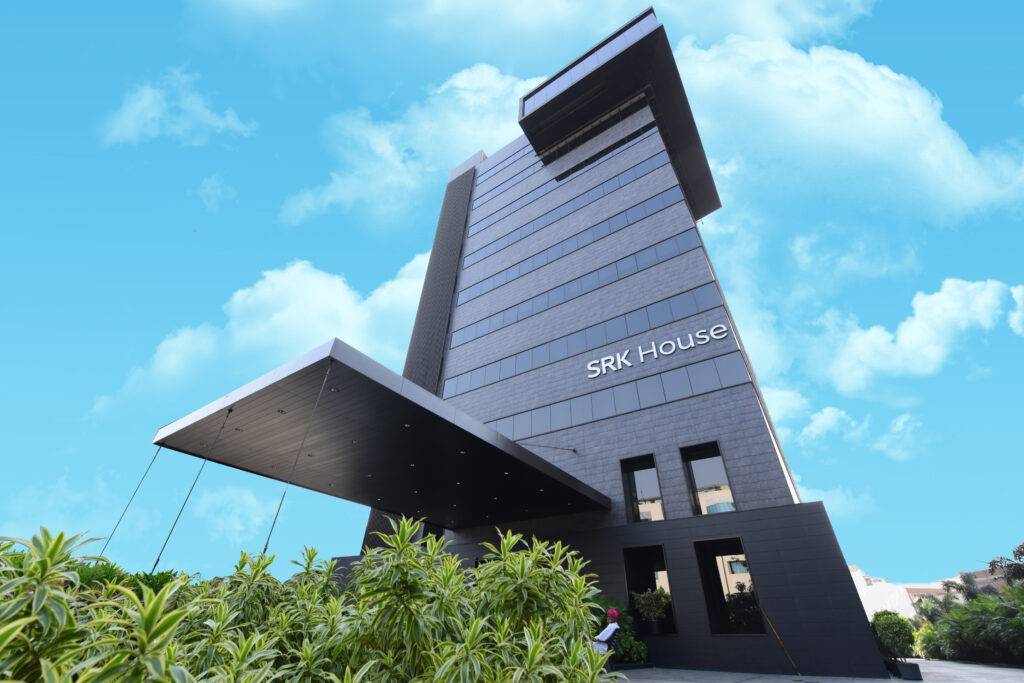
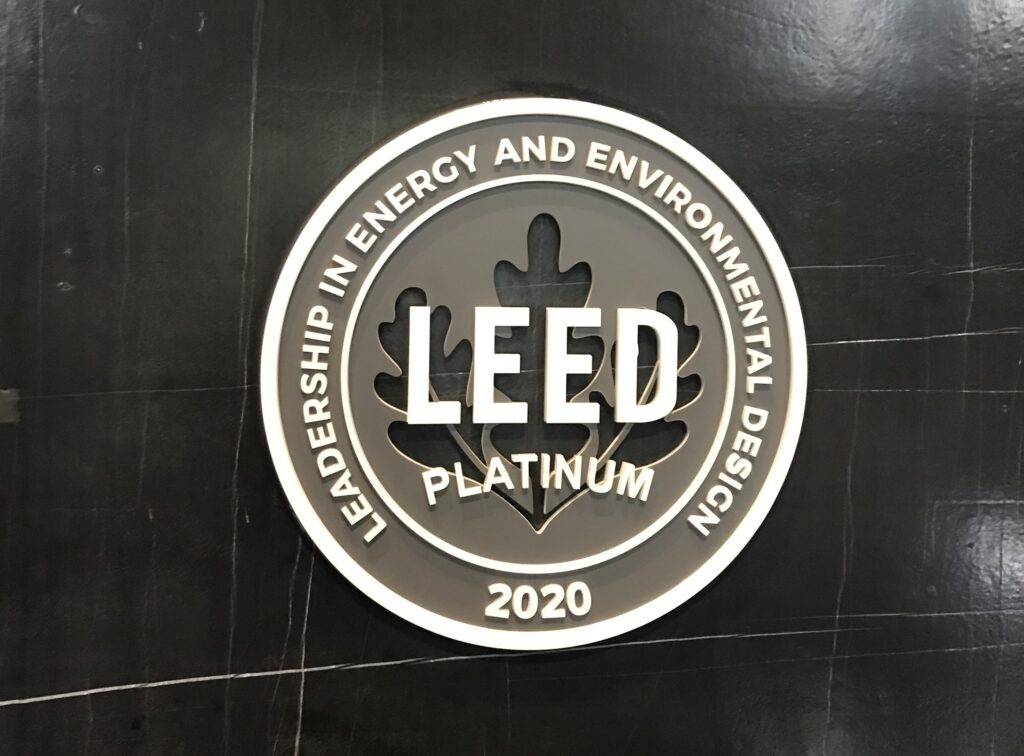
SRK Exports Private Limited’s ultra modern new office, SRK House, built recently, which has garnered the elite LEED PLATINUM rating of the US Builders Association (building picture source: Diamonds are Forever, So Are Morals, LEED sign picture by SB Veda)
.
My trip to Surat enabled me to sit down with the visionary business leader and philanthropist, and what follows is an excerpt of that long conversation:
SB Veda: “Mr. Dholakia, Thank you for having me. Let’s start by your kindly telling me how you’ve managed to help transform Surat during your career of 58 years.”
Govind Dholakia: “Please call me Govind Kaka”
SBV: “Sure”
GD: “When I came to Surat, there was no infrastructure. All roads were mud roads. Pollution was rampant. There were open drains. The city today is nothing like that, and I have done my part. Of course, I can’t claim credit for all of the changes. Narendrabhai Modi has done a lot for the state.”
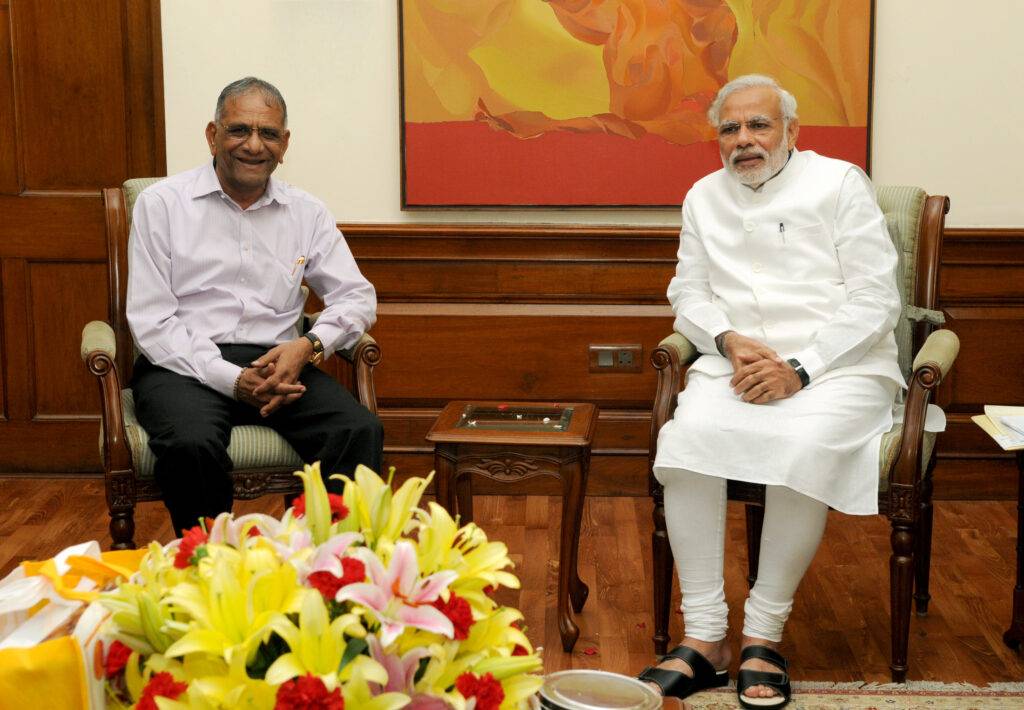
SBV: “You’ve known Prime Minister Modi since he was Chief Minister of Gujarat. While he may have done a lot for the state, he has been a polarizing figure due to the riots that killed so many Muslims and a lesser number of Hindus.”
GD: “Yes…that was a complicated incident and Narendra Modi Bhai’s reputation was affected. In particular, he got a lot of bad press abroad. But Muslims, now, are doing a lot better in Gujarat.”
SBV: “How so?”
GD: “Economically, their position has improved.”
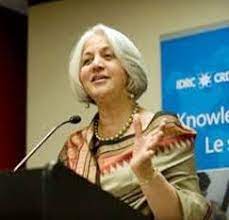
GD: “I’ll give you an example. When we invited Mrs. Isher Ahluwalia, a renowned economist, Padma Bhushan winner, and ex-wife of Deputy Planning Commissioner, Montek Singh Ahluwalia, she toured Surat’s main Muslim area where 100,000 people were relocated to an area where they were given new housing. This is near the Tapthi River. Now, these areas are so heavily populated by Muslims, you would not be able to tell them apart from any city in Pakistan but it’s very calm and quiet. .
Padma Bhushan Awardee, Isher Judge Ahluwalia (File)
Wherever she went, she asked to stop the car in various places to talk to members of the community as she did not believe our claims that the situation has so improved for them.
Not a single family or local business she spoke to was dissatisfied with their position because of the economic advancement that took place under Narendrabhai Modi. They said they were safe, they had better housing and jobs, and we’re doing comparatively a lot better. Actually, many of these people have become very wealthy under Narendrabhai. Modi Even Muslim businesspeople have embraced and endorsed the now Prime Minister.
(I checked Mr. Dholakia’s facts with reports online, and indeed found various articles in reputable publications, which verified his claims. They are referenced with links at the end of the article.”
SBV: “Communalism aside, when you started in the diamond industry, you were only fourteen years old – a time when most children are in school. Even fifteen years ago, I read an article in a British newspaper, which accused Surat of being a hub of child labour. What steps have been taken to deal with this issue?”
GD: “We eradicated it. Our company never used child labour, and we advocated for others to stop the practice. Having been a child labourer, myself, I know what it’s like to have one’s childhood taken away. So, the issue is very close to my heart.”
GD: “Indeed, when I invited Kailesh Satyarthi, the famous child labour activist, to come to our facilities, he said, ‘Why should I visit with a diaomonder (sic)? Diamonders (sic) use child labour and my life’s work has been to advocate against this practice, so why should I visit with you? I’m not coming. Still, I convinced him to come, and told him, ‘Which factory, you want to go (sic)? You are very skilled at finding out where child labour is taking place. We will take you where you want to go. You find me out any child labour. We took him all over, and he could not find single factory where children were being used as labour. He was amazed by it!”
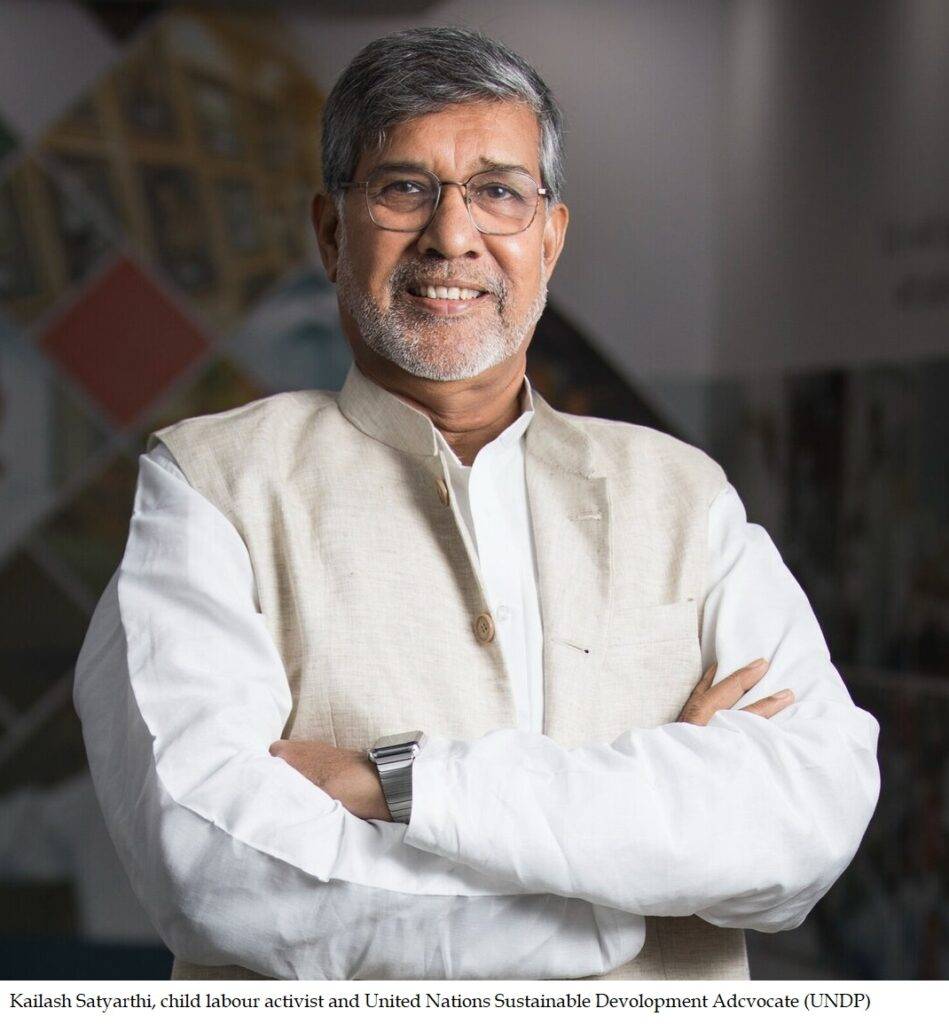
GD: “Indeed, when I invited Kailesh Satyarthi, the famous child labour activist, to come to our facilities, he said, ‘Why should I visit with a diaomonder (sic)? Diamonders (sic) use child labour and my life’s work has been to advocate against this practice, so why should I visit with you? I’m not coming. Still, I convinced him to come, and told him, ‘Which factory, you want to go (sic)? You are very skilled at finding out where child labour is taking place. We will take you where you want to go. You find me out any child labour. We took him all over, and he could not find single factory where children were being used as labour. He was amazed by it!”
SBV: “Certainly, if your facilities are any example, you’ve done a lot for Surat. I’ve never seen such forward-thinking modern facilities in all of India – even at offices of Tata Sons. People say that they are the best employers in India but your offices and factory facilities are in fact, better than what I’ve seen of even them.
GD: “Thank you.”
SBV: “And, another thing that I thought was novel was the fact that at your relief centre, students become eligible for scholarship after reading the Bhagavad Gita. I thought that was a very novel way of introducing Hindu philosophy to the younger generation.”
GD: “Even in our company, we practice those principles. If anybody comes to me with an issue, it’s not that I’m their boss. They address me as “uncle,” so we approach every issue just like a family should – with love.”
SBV: “Let’s talk about your spirituality. In Hinduism, we say that each person should act according to their dharma. I’m interested in the influences that led you down the path you’ve taken. So, to put it in ‘diamonder’s‘ terms, if you were, say, a rough diamond as a child, who has contributed to polishing you and making the cuts needed in your character to make you shine?
GD: First, let me say that much has to do with my nature – but who made my nature, its nature? God. There is acceptance of circumstances I can’t change. If one accepts hardship as a challenge, one can overcome it. I never was deterred or saddened by my situation or any setback. I simply worked hard to find a way around the obstacle. It is first and foremost my faith in God, strengthened by my reading of the Srimad Bhagavad Gita, which I read so many times, internalising it and learning by heart, which has made me who I am, today. I had kind of a samadhi (entered into a trance-like state) and that has enabled me to find that path. And, this created my luck or fate or destiny, whatever one calls it. Second was father whose example showed me the importance of always working hard and to tell the truth. My mother, too, reinforced being honest. She always thought from her heart. She would share whatever small things she had with us, with the family, with the village. So, from her I came to understand the importance of sharing my success, giving to others, giving back to society at large. And, one of my early influences was Dongreji Maharaj. He told me that, ‘he who cannot see God in his brother cannot serve the country or serve God.’ In a way, I took it literally, and that’s why I brought my brothers into the business. And, he gave Bhagavad katha, I took seven days off of work and worked at night to attend this katha for seven days, and I fell into a Samadhi-like trance. If I have am shining, today, it would be due to these factors. These beloved souls cut the rough stone, and I have been polishing it ever since!
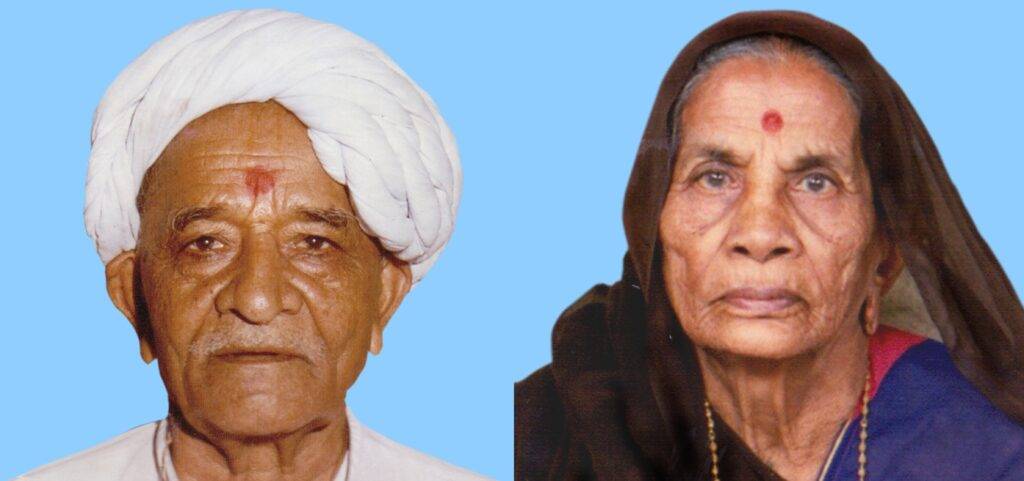
SBV: Falling into Samadhi, this is a characteristics of monks. Given your spiritual inclination, why didn’t you seek the saffron, and become a sadhu? Because you already had that monk-like nature in you.
GD: Well, this is the first time, somebody asked me this question. Dharma, Bhakti, observing austerities, and working for others, these traits are present in both Sadhus and also the householder-sadhu. I decided to emulate King Janaka, to be involved in the world but also to renounce it. So, I should say that I am a householder but inside I have those traits. I work not for my personal gain but because it is my dharma. I also believe that one must believe in oneself because belief in oneself is also belief in God because our true nature is divine.
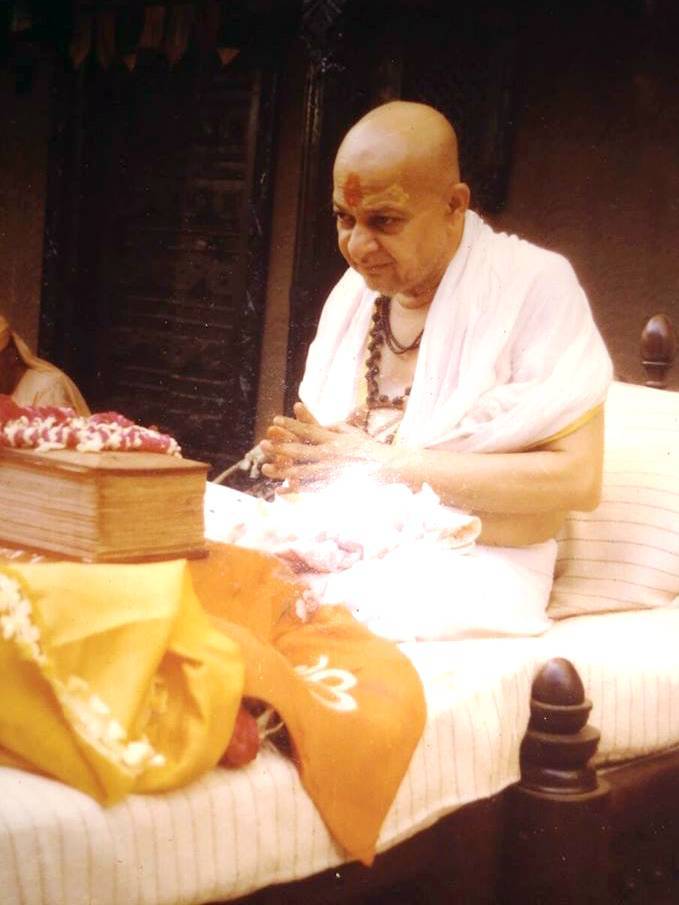
SBV: When you began your career, India was truly impoverished and backward beset by famines and lack of resources. It wasn’t the India that we see today in which so many have been economically uplifted by liberalisation. Yet you saw India as a place that would attract wealth where others could see only misery. Why is that?
GD: Well, first and foremost, I knew that Indian culture was fundamentally good. If people grasped that, we would see a new generation of those who would be doing well. Also, with people being hungry, I knew they would not rest on their laurels. Being in discomfort spurs effort. So, deep down that, even though at the time, the country was wretched, I had this deep belief that practice of Indian values in an independent country would turn things around. And, problems are opportunities – there is no problem that is insurmountable.
GD: Look, for the first five years of my career, I worked 14 hours a day for peanuts. Some might see this as a hard existence but when I worked on a farm, I worked the same hours but in the blistering Gujarat sun. This way, I at least was working in the shade. So, you see, it’s all about perspective. And, I think most successful Indians at the time had that perspective. Progress can only be made outside of one’s comfort zone.
SBV: You lived through a very different period in India than what we know now. I speak of the license raj era. In 1992, the country went through liberalization, and life radically changed within a few short years, and the evolution continues. What do you think are the benefits and drawbacks of liberalization?
GD: Prior to 1992, life was very hard. There were few choices and goods were very limited. Power cuts were a part of life. But, post-1992, the plus points are maybe 85%, minus points, 15%. Let me give you an example: in the late 70’s and 80’s when we travelled to Europe and came back, we’d have to spend an hour in immigration and maybe two to three hours going through customs – for no good reason. It was just bureaucracy and the officials seemed to have this desire or maybe they were instructed to make people wait. Foreign currency reserves were low, so we weren’t allowed to take much money outside the country. Still, I would buy gifts for my family. What I found that Rs. 3000 worth of gifts brought in would require Rs. 6300 worth of duties. This was at a time when a plane ticket to Europe (return ticket) was only Rs. 4,800. The customs duty for Rs. 3,000 of frocks and toys was more than a plane ticket!
SBV: That’s terrible.
GD: In the sixties, the economy was so controlled, we weren’t allowed to have more than 200 grams at a time once in a month. If you took 500 grams, you would get caught by the police. At that time, there was a real scarcity of food. In Kolkata, 2 million people died of starvation. Today, we can export food. The revolution in agriculture and relaxing of rules, have lessened starvation to a tremendous degree. It’s like we’re living in heaven now compared to how it was.
SBV: In your book, you mentioned on the 50th anniversary of your career, you were given a Rolls Royce Phantom by your family. But you also talk fondly about riding around in your Royal Enfield Bullet in the 1970s with your new wife, Champa, the wind in your hair, enjoying your freedom as a young man. When were you happier?
GD: They were different kinds of happiness: on the bike I was young and free and life was full of possibility but I didn’t have much. The Rolls Royce signified my cumulative accomplishments over a half century. It gave me great satisfaction. Maybe I was happier on the bullet than the Rolls Royce. Come to think of it, I was happiest when I was first riding bicycle because learning how to ride was one of the most exciting things in my life. I still enjoy the bicycle.
SBV: Have you made mistakes? What would be your greatest mistake and what did you learn from it?
GD: Good question; I’ve not made any huge mistakes for which I repent. I’ve made some small mistakes. One comes to mind: for ten years, 1982-1992, SRK was doing, and we were content – maybe too content – because we didn’t make progress. We didn’t’ advance. Today, we are constantly evolving, and we have to keep reinventing ourselves, the way we do things, our business lines – for instance, we are into IT consulting, now – we don’t rest on our laurels.
SBV: Let me put it another way, what would you say was your most formidable challenge and how did you face it?
GD: Another good question. The fact that I didn’t have an education was my biggest obstacle. I didn’t know English, and yet I had to run an export business that dealt with Europeans. I won the confidence of Naveen Chandra and associates, partnered with them to overcome my limitations. I went to Europe with them and was able to procure diamonds from Belgium. Fortunately, the partner was reputable and trustworthy. But it certainly exposed me to risk.
SBV: What made you decide to start an airline.
GD: My experience in Europe. You see, Surat at that time had a population of 3 million and had no decent airport. One had to take chartered flights and commercial airlines didn’t land or take off from it. Whereas in Brussels they had a population of only 2 million. Yet, 300 flights were coming in on a daily basis. So, I decided and asked some friends to join me in creating a domestic airline just to keep the airport in functioning condition, and facilitate it being an air hub for other airlines to use.
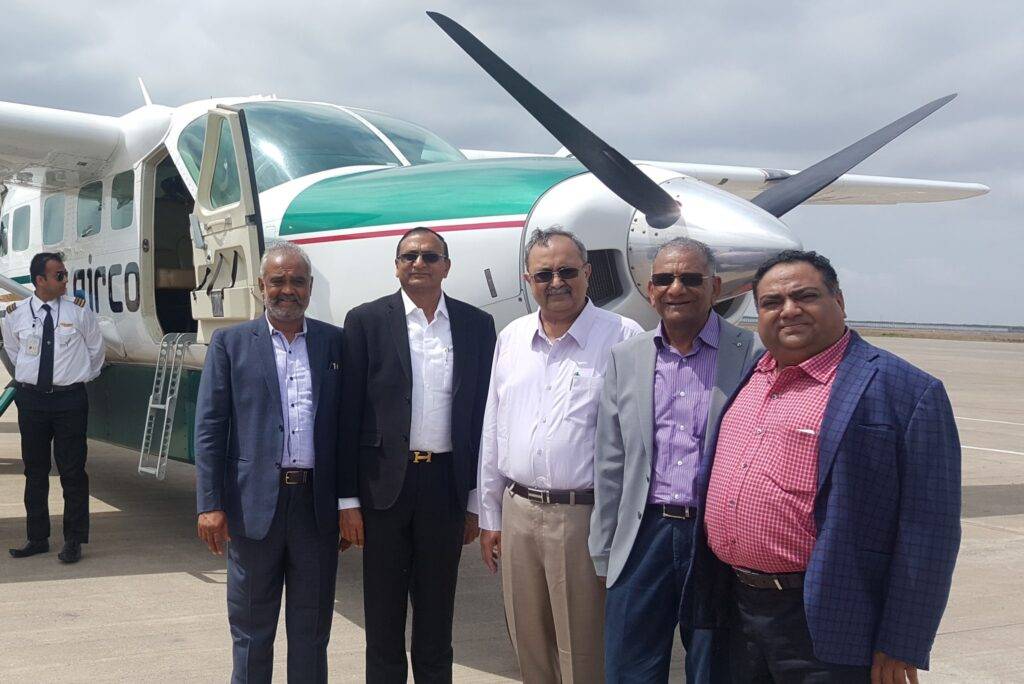
SBV: That’s Ventura Airlines?
GD: Right
SBV: How has it fared?
GD: It’s a money-losing business and we knew it would be so. It was more a public service than anything. We invested ten Crore each and lost twenty-two., though we break even, now, and the airline serves the needs of the family. On balance, our purpose was served, which was to give back to Surat. Now, five airlines fly to eight airports, including international fights totalling around 30 flights a day – that’s down from. 40 flights before Corona.
SBV: Can you remind me what year was the SRK company started?
GD: We started working in the diamond business in 1964 when we came to Surat, and, the company was started in 1970. But it was only registered in 1976
SBV. So, Let’s end on looking to the future. What do you foresee for the company in say, 2026, when fifty years after your company registration?
GD: Today, the volume is $ 1.5 billion. By 2026, we want to grow that to 4 billion. While we don’t know the future, we don’t know what will happen, tomorrow. But all the young people in the company (we have four generations in the company, now) went to a corporate retreat in Jaipur for three days, and after talking for three days, we decided to diversify more and grow the business along different verticals. We are very positive about the software business in which we have partnered with a company in Pune. Currently, we are doing Rs. 100 Crore in this business but in four to five years, our partner thinks we could be doing 3000 Crores.
SBV: Sounds promising. I wish you the best.
GD: Thanks
SBV: That’s all I have for now. Mr. Dholakia, Govind Kaka, thank-you for spending this time with me, this afternoon.
GD: My pleasure.
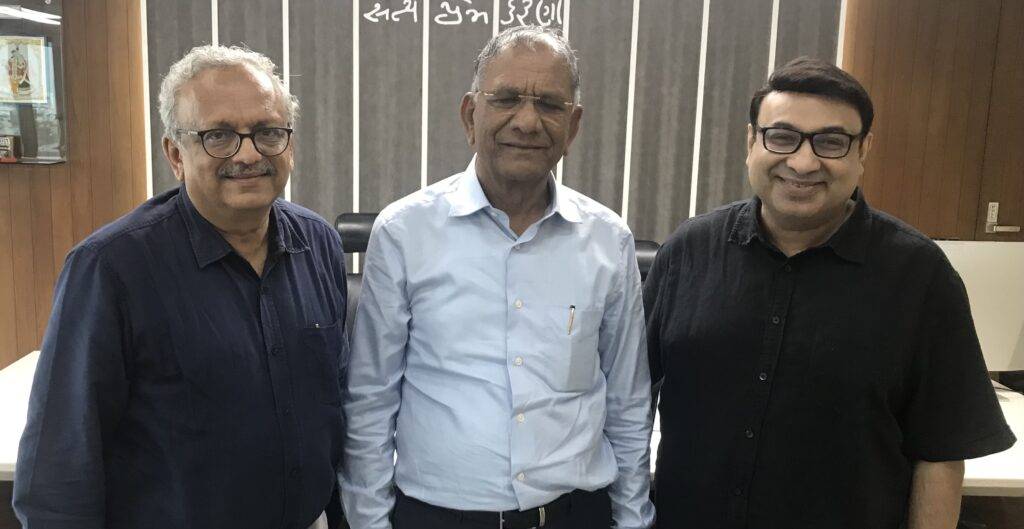
REFERENCES:
- Diamonds are Forever, So Are Morals– by Govind Dholakia as narrated to Arun Tiwari and Kamlesh Yagnik
2. Why many Muslims in Gujarat publicly supported Modi’s BJP after 2002 – by Rahil Dhattiwala, The Print, 6 April, 2019
3. PM Modi has worked for Muslim community, while breaking sway of vote bank politics – by Amin Pathan, The Indian Express, 6 October, 2020
4. Modi government consulted Muslim outfits before action on PFI – wire, the Hindustan Times, 28 September, 2022
 The Global Calcuttan Magazine
The Global Calcuttan Magazine